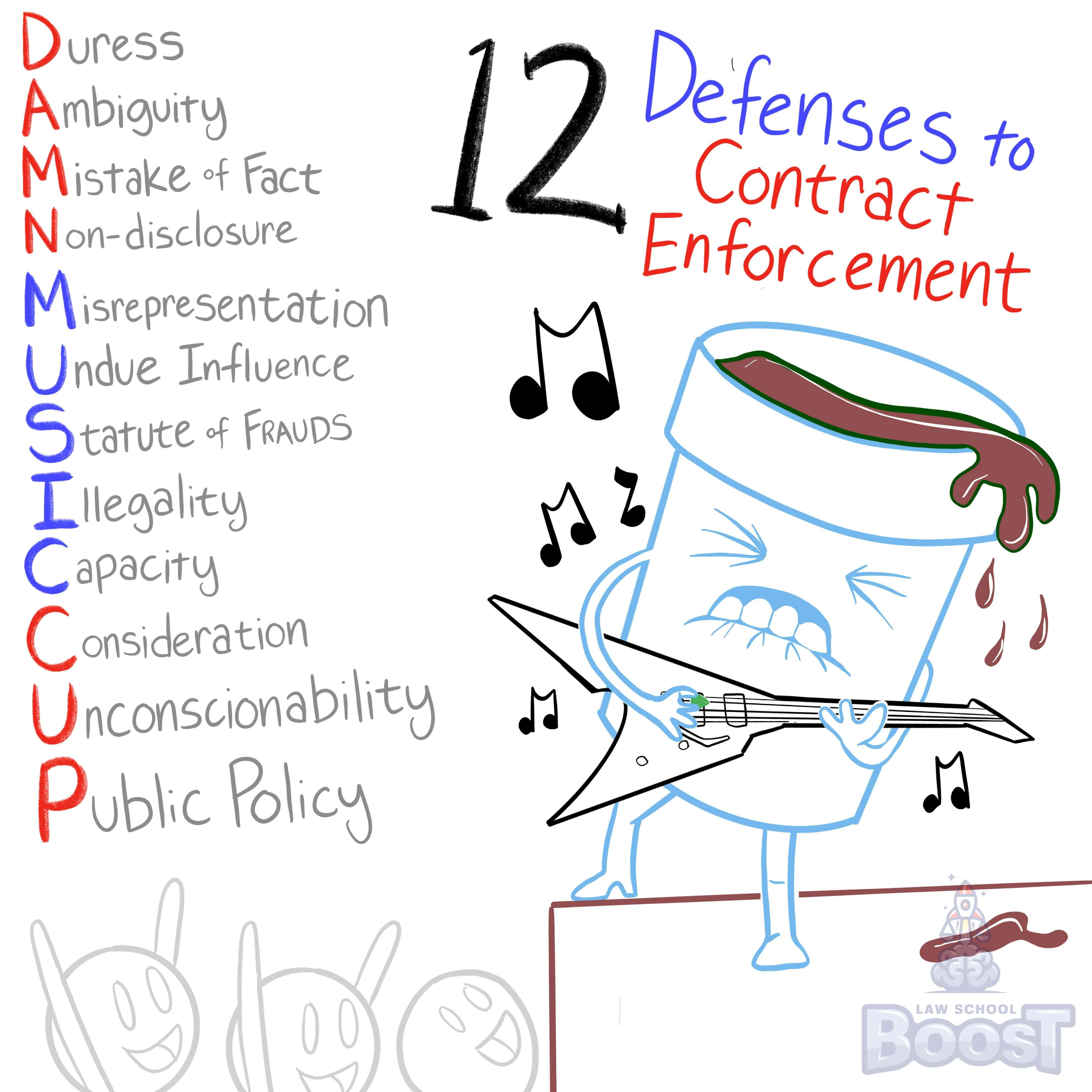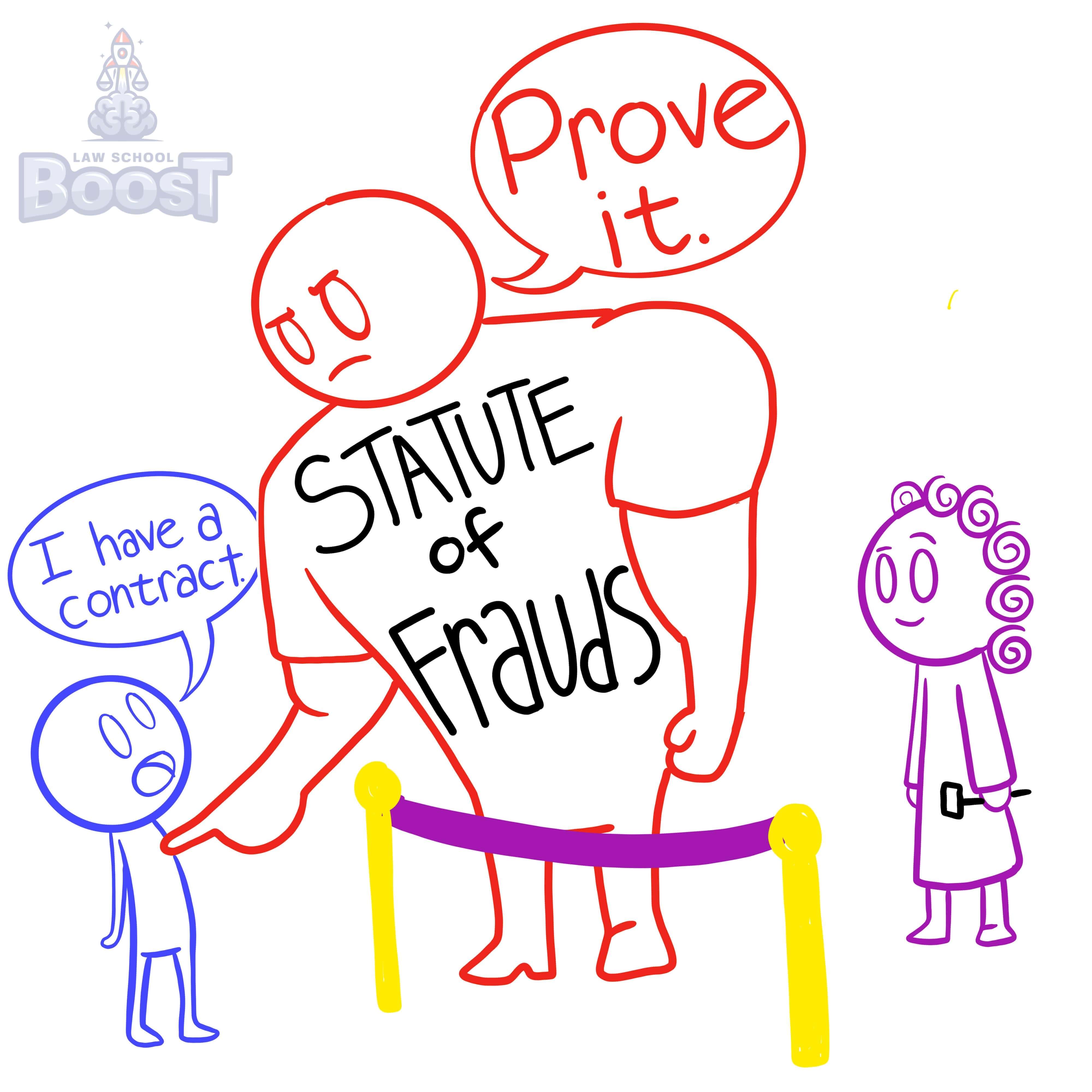🤔
Contracts • Defenses to Enforcement and Formation
K#053
Legal Definition
There are 4 types of contracts within the Statute of Frauds: (1) suretyship contracts; (2) service contracts not capable of performance within a year; (3) transfers of interests in real estate; and (4) sales of goods for $500 or more.
Plain English Explanation
When you identify a contract on an exam, you should check to see if it falls into one of the 4 types of contracts that "fall within the Statute of Frauds," meaning there must be a written, signed contract in place. No written contract? Then it "fails the Statute of Frauds," meaning a court will not allow the case to be heard.
The 4 types of contracts that must satisfy the Statute of Frauds with a written contract are:
(1) Contracts involving the co-signing of debt, otherwise known as "suretyship contracts";
(2) Contracts involving a service that is not possible to be performed within a year (e.g., a contract for 2-years worth of maid service... it's impossible for it to be completed within a single year, since it's 2 year's worth, so it must be in writing);
(3) Any transfer of real estate (e.g., purchasing property, selling property, leasing property, etc.);
(4) The sale of any goods for at least $500. Note that this is very commonly tested. Anytime you see a contract with a price near $500, it's usually trying to test you on Statute of Frauds.
The 4 types of contracts that must satisfy the Statute of Frauds with a written contract are:
(1) Contracts involving the co-signing of debt, otherwise known as "suretyship contracts";
(2) Contracts involving a service that is not possible to be performed within a year (e.g., a contract for 2-years worth of maid service... it's impossible for it to be completed within a single year, since it's 2 year's worth, so it must be in writing);
(3) Any transfer of real estate (e.g., purchasing property, selling property, leasing property, etc.);
(4) The sale of any goods for at least $500. Note that this is very commonly tested. Anytime you see a contract with a price near $500, it's usually trying to test you on Statute of Frauds.
Hypothetical
Hypo 1: Sam wants to buy a car, but Sam has bad credit. Sam brings Bob with him to the car dealership. Bob tells the salesman, "It's okay -- sell Sam the car, and if he can't pay for it, I'll cover it." The salesman agrees and sells Sam the car. Result: Bob's offer to cover Sam's debt is an oral contract. However, it fails the Statute of Frauds because it needs to be in writing, since it is a suretyship contract, which must satisfy the Statute of Frauds with a signed writing.
Hypo 2: Sam offers to sell Bob his car for $500. This is a great deal. Bob says "I accept!" Sam then writes up a sales contract and signs it. Bob decides he no longer wants the car and refuses to sign. Result: Sam made an offer, and Bob accepted that offer. There is an oral contract. However, the item being sold is $500, which means it must satisfy the Statute of Frauds. Here, Sam made a contract and signed it himself, but Bob didn't sign it. In order for Sam to enforce the contract against Bob, Bob must sign it. Since he did not, the Statute of Frauds is not satisfied.
Hypo 2: Sam offers to sell Bob his car for $500. This is a great deal. Bob says "I accept!" Sam then writes up a sales contract and signs it. Bob decides he no longer wants the car and refuses to sign. Result: Sam made an offer, and Bob accepted that offer. There is an oral contract. However, the item being sold is $500, which means it must satisfy the Statute of Frauds. Here, Sam made a contract and signed it himself, but Bob didn't sign it. In order for Sam to enforce the contract against Bob, Bob must sign it. Since he did not, the Statute of Frauds is not satisfied.
Visual Aids



Related Concepts
What are the 12 defenses to enforcement and formation?
What are the 4 methods of satisfying the Statute of Frauds?
What are the requirements for a judicial admission to satisfy the Statute of Frauds?
What are the requirements for performance to satisfy the Statute of Frauds in a sale of ordinary goods?
What are the requirements for performance to satisfy the Statute of Frauds in a sale of specially manufactured goods?
What are the requirements for performance to satisfy the Statute of Frauds in a service contract?
What are the requirements for performance to satisfy the Statute of Frauds in a transfer of real estate?
What constitutes a service contract not capable of performance within a year?
What constitutes a valid transfer of interest in real estate?
What constitutes lack of capacity?
What is a merchant's confirmatory memo?
What is a person without capacity legally obligated to pay for?
What is a suretyship contract?
What is the effect of ambiguous words in an agreement?
What is the effect of a mutual mistake of fact on the formation of a contract?
What is the effect of a unilateral mistake of fact on the formation of a contract?
What is the effect of duress on the formation of a contract?
What is the effect of misrepresentation on the formation of a contract?
What is the effect of non-disclosure on the formation of a contract?
"What is the effect of provisions in contracts requiring written modifications?"
What is the effect on an agreement if its purpose is illegal?
What is the effect on an agreement if its subject matter or consideration being illegal?
What is the result of a covenant not to compete that lacks reasonable need or time and place limits?
What is the result of an exculpatory agreement that exempts intentional or reckless conduct from liability?
What is the Statute of Frauds?
What is unconscionability and its effect on the formation of a contract?
What is undue influence and its effect on the formation of a contract?
What rights does a contracting minor have upon reaching the age of majority?


